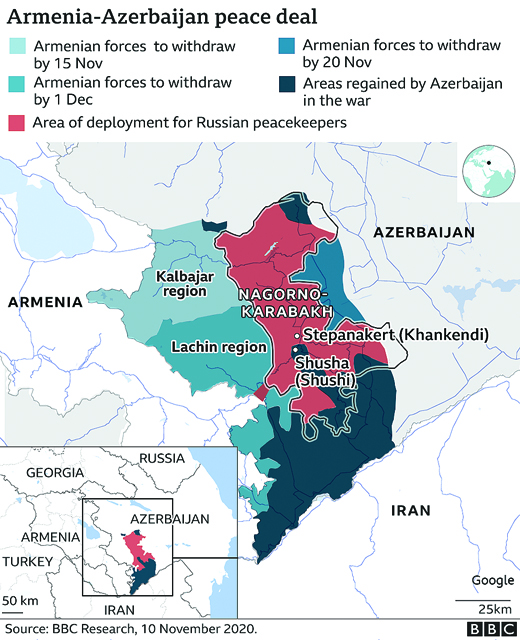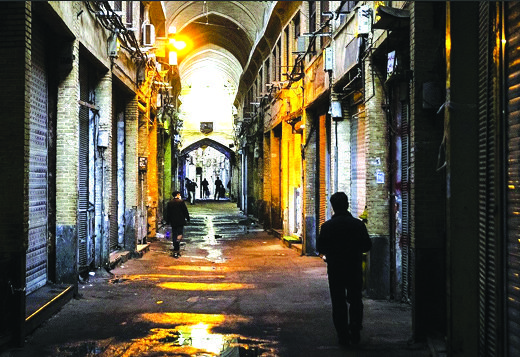November 27, 2020
by Warren L. Nelson
 Nagorno-Karabakh has acknowledged defeat and agreed to a ceasefire under which it will give up all the land it had seized beyond its borders 30 years ago as well as a large chunk of Nagorno-Karabakh itself.
Nagorno-Karabakh has acknowledged defeat and agreed to a ceasefire under which it will give up all the land it had seized beyond its borders 30 years ago as well as a large chunk of Nagorno-Karabakh itself.
Local commentators said Nagorno-Karabakh was defeated by the coronavirus and by Azerbaijani drones. The disease, plus dysentery, had left large numbers of its troops unable to fight. The drones were something Nagorno-Karabakh had not planned for and which it was unable to counter.
The Iranian military may well see the impact of drones as an endorsement of its own emphasis on drones and missiles as opposed to traditional planes and tanks. That could make the Iranian military more willing and eager to take on the US military.
Politically, however, the Islamic Republic is unlikely to be pleased with the outcome because it will see a greatly strengthened Azerbaijani government that is allied with Turkey and with Israel. The Islamic Republic has also always feared that an Azerbaijan not distracted by its stalemate with the Armenians would make appeals to the millions of Azerbaijani ethnics who live in Iran.
Iran has effectively been allied with Armenia the last three decades. But when the war began September 27, Iranian Azerbaijanis demonstrated in vast numbers to demand that the regime cease helping the Armenians. The government then began loudly proclaiming its neutrality in the dispute. But the reality remains to be seen.
Israel has heavily armed Azerbaijan in recent years and Iran fears—based on its own public remarks—that Israel will be allowed to put spy stations on its northern border. Iran has also objected vehemently to “mercenaries” being allowed into Azerbaijan—a reference to more than a thousand Syrian Kurds funded by Turkey that Turkey flew into Azerbaijan to join the fighting. Iran had been fighting those Kurds in Syria and is deeply troubled by their presence in Azerbaijan.
The Israeli-Turkish-Syrian Kurd presence in Azerbaijan is likely to make the Islamic Republic more hostile to Baku, rather than less, despite the feelings of Iranian Azerbaijanis.
The ethnic Armenians of Nagorno-Karabakh rose up for independence in the late 1980s as the Soviet Union was dissolving. Azerbaijan and Armenia emerged as independent states in 1991 when the Soviet Union was dissolved. The Armenians of Nagorno-Karabakh then moved into high gear and seized control, not just of Nagorno-Karabakh itself, but also of the areas populated by Azerbaijanis to the south up to the Iranian border and to the west up to the Armenian border. A 1994 ceasefire cemented control over that area by Nagorno-Karabakh.
Fighting broke out every few years, but none of the incidents amounted to much and Nagorno-Karabakh, which the locals call Artsakh, retained its position. That was remarkable since the Artsakhers number only about 150,000 while Azerbaijan has a population of 10 million.
On September 27, Azerbaijan started a major offensive. It concentrated in the south to retake the area between the Iranian border and Nagorno-Karabakh. After gaining that ground, the Azerbaijanis launched northward into Nagorno-Karabakh aimed at the city of Susha, the second largest city in the region, second only to Stepanakert, Nagorno-Karabakh’s capital, which lies only about 10 kilometers (6 miles) north of Susha.
Once Susha fell November 8, the military situation was grim for Artsakh. The Artsakh leadership, under President Arayik Harutyunyun, and Armenia, under Prime Minister Nikol Pashinyan, agreed that continuation of the war would mean a disaster for the people of Artsakh. Armenia then signed the ceasefire agreement November 9 with Russia and Azerbaijan.
Under the agreement, the Artsakh forces must leave all the territories they had occupied the last three decades, allowing more than half a million Azerbaijanis displaced from those lands and forced into refugee camps to return. They may not find much. Many of them set their own homes afire when they left three decades ago. And many of the Armenians who replaced them have now set their homes alight as they fled the area.
Azerbaijan will also continue to hold the pockets of territory within Nagorno-Karabakh that it seized during the six-week war, about 30 percent of the land area of Nagorno-Karabakh. Artsakhers living in those areas will presumably choose to move into the remaining part of Nagorno-Karabakh that will continue to be run independently of Azerbaijan.
To enforce the ceasefire, Russia is deploying 1,960 troops and 90 armored vehicles to patrol the area. The Russians will also make sure that a five-kilometer wide corridor—the Lachin Corridor—between Nagorno-Karabakh and Armenia remains open for contact and supplies between Armenia and Nagorno-Karabakh.
The agreement also provides for the Russians to secure a corridor across Armenia so Azerbaijan can reach the enclave of Nakhichevan. For the last three decades, Azerbaijan has had to move through Iran to keep in touch with Nakhichevan.
This initially produced great anxiety among many in Iran as social media comments said Russia would close the Armenian border with Iran and control the link between Azerbaijan and Nakhichevan. The Islamic Republic has tried to quell those fears, saying there will be no change in Iranian access to Armenia. The link is expected to be a highway that will be patrolled by Russia and may use convoys between Azerbaijan and Nakhichevan, much like West Germany reached West Berlin for decades over a highway that remained part and parcel of East Germany.
The link means Azerbaijan will no longer be dependent on Iran for reaching Nakhichevan. However, Nakhichevan gets its natural gas from Iran and will remain dependent on Iran for that, so the Islamic Republic does not lose all leverage.
From public comments made by Iranian officials, it appears the Islamic Republic’s main goal now is to make sure the Syrian Kurdish troops are quickly removed from Azerbaijan.
In addition, the agreement provides for a headquarters to monitor the ceasefire to be set up in Azerbaijan and manned not only by Russians but also by Turks, cementing the rising role of Turkey in the region. But Russia said flatly that Turkey would have no peacekeepers in the area.
The ceasefire agreement proved very popular in Azerbaijan, where masses of people took to the streets in joy. They waved the flags of Azerbaijan and Turkey—and even of Israel.
But in Yerevan, capital of Armenia, angry mobs opposed to the deal ransacked parliament, the prime minister’s office and other government buildings. They captured and beat the speaker of parliament so badly that he required surgery. Seventeen opposition parties joined in the protest, according to the BBC.
Both Artsakh leader Harutyunyun and Armenian Prime Minister Pashinyan said they had to agree to end the fighting or see Artsakh suffer even more. The prime minister said Artsakh faced “total collapse.”
Harutyunyun said his troops had been whipped. “The morale and psychological condition of the army was extremely poor. We suffered heavy human losses yesterday [the last day before the ceasefire].” He blamed those losses on drone attacks. “If the fighting continued at that pace, we would have lost Artsakh within days and would have had many more victims.”
Artsakh said its military death toll totaled at least 2,317, with others missing and possibly dead. That suggests Artsakh lost 1.5 percent of its population in six weeks of fighting. (By comparison, about 2.2 percent of the US population died in the four years of the Civil War.) Azerbaijan has released no military casualty figures.
The agreement does not give Azerbaijan all it wanted. It had wished to crush the independence of Nagorno-Karabakh completely. But Artsakh will continue, albeit in slightly more constrained borders, while Azerbaijan regains control of all the lands previously inhabited by ethnic Azerbaijanis.
The Russian troops enforcing the ceasefire are to remain for five years, with the option of renewing their stay at the end of that period.
Russia has been part of group seeking to solve the crisis for the three decades. The other members of the group are France and the United States. But Russia negotiated the ceasefire with Armenia and Azerbaijan and ignored France and the US. Artsakh was not a party to the talks, but it has effectively been represented to the outside world for the last three decades by Armenia.























